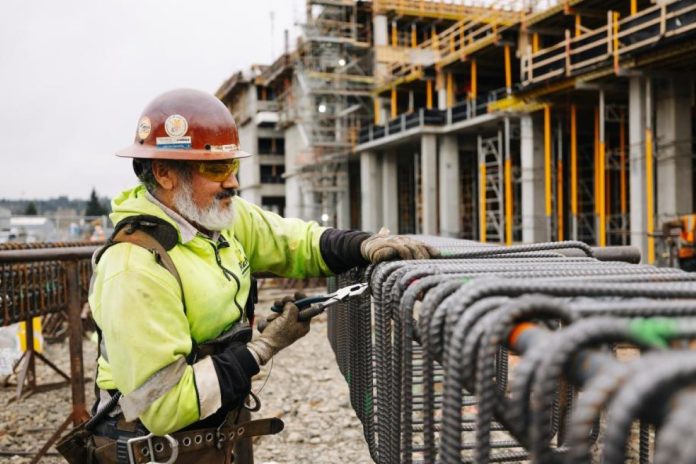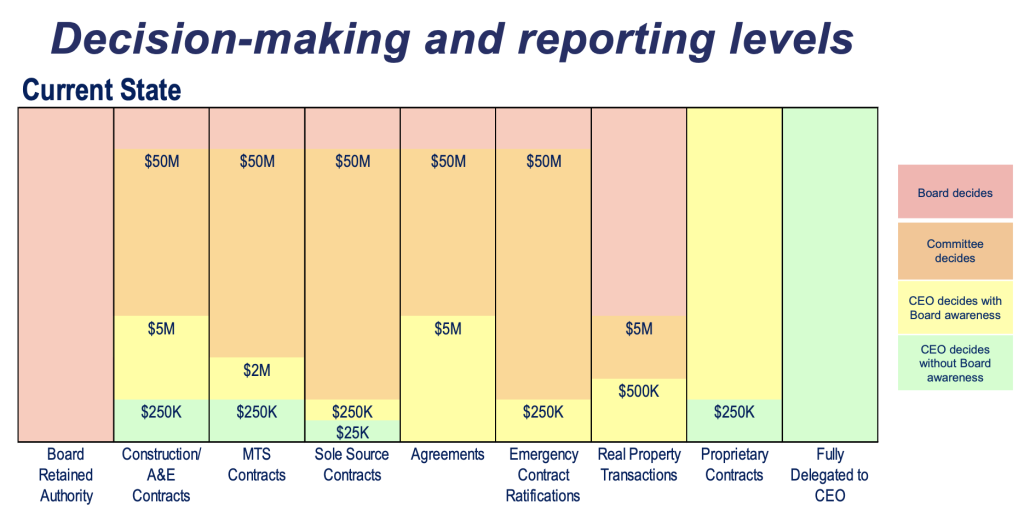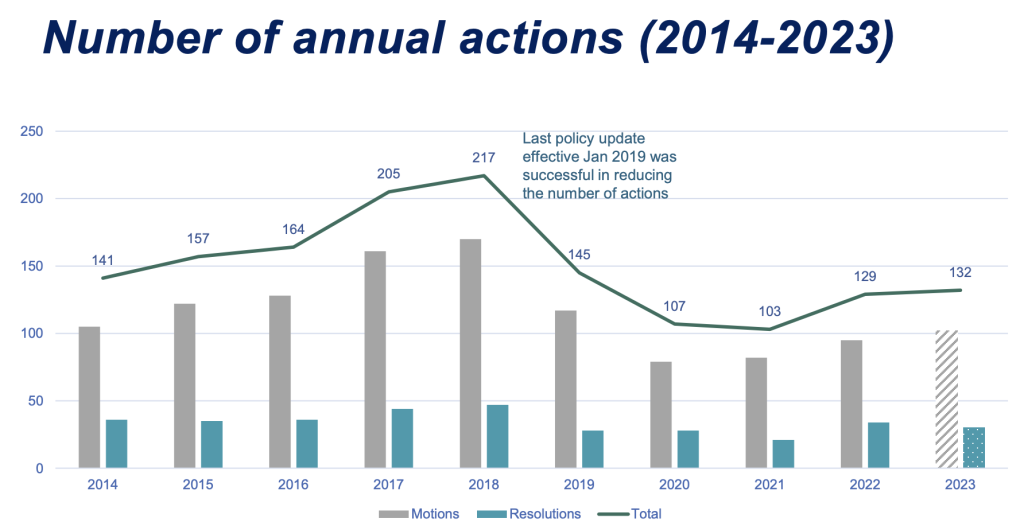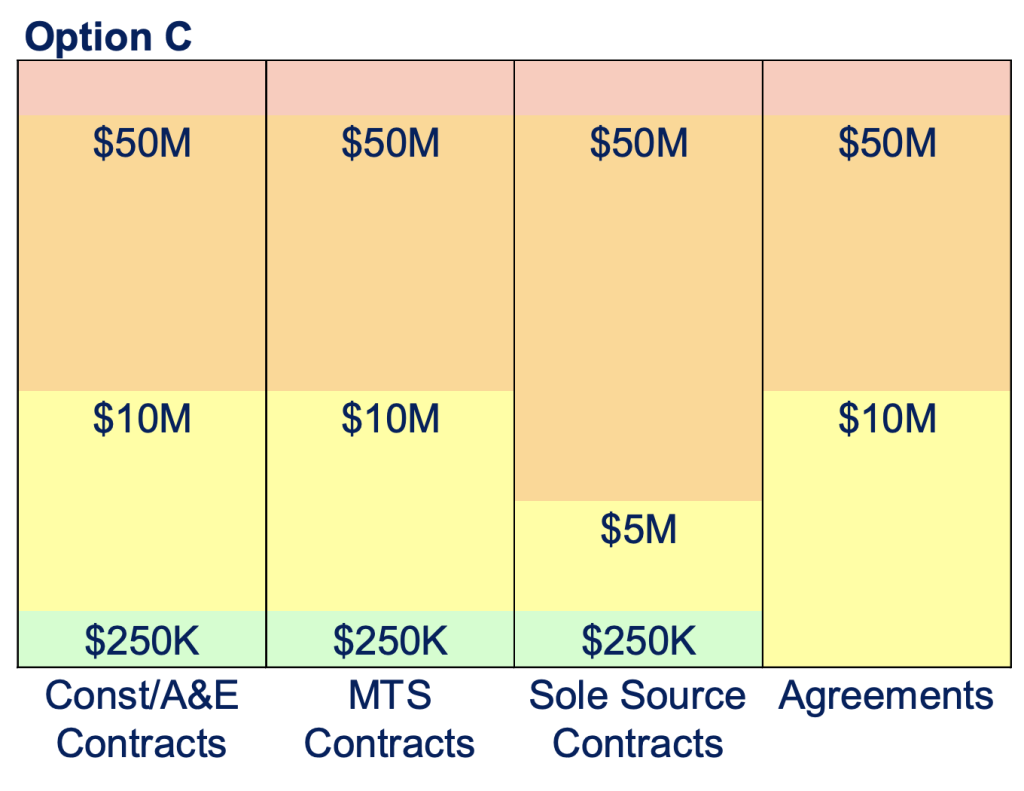
Sound Transit is moving ahead with a search for new executive talent and in coming months will hire three people with megaproject experience in transportation projects to guide the Sound Transit 2 and 3 capital programs. The agency is also advancing a slate of other operational improvements prescribed by the Technical Advisory Group (TAG), a group of outside experts.
Sound Transit advances recruitment process for megaproject experts
The recruitment effort appears to be a U-turn from what Sound Transit management were proposing to the agency board of directors in April. At the time, CEO Julie Timm and Deputy CEO Brooke Belman tried to sell the board on a different management and reporting structure.
Belman is currently head of the planning and construction groups, and the earlier proposal was for the agency to hire for just one megaproject expert position below her. That new hire would be responsible for the West Seattle and Ballard Link Extensions (WSBLE) as well as the Tacoma Dome and Everett Link Extensions. Separately, Belman had suggested that Sound Transit would outsource for expertise by hiring consultants in a program management capacity for the WSBLE projects.
In March, the board’s ad-hoc TAG explicitly called for three megaproject experts to be hired on in a permanent capacity. One of those megaproject experts, the TAG envisioned, would have full responsibility in all facets of the Sound Transit 2 and 3 capital programs, including planning and construction management, and directly report to the CEO. Below that megaproject expert, two more megaproject experts would act as deputies with separate management of the two capital programs.
Sound Transit boardmembers told agency executives in April that their alternative management structure proposal did not comport with the TAG recommendations and that staff shouldn’t get too attached to existing agency structures. That advice has apparently carried through with the selection of Krauthamer and Associates to conduct recruitment for the three megaproject expert positions.
Last month, boardmembers expressed strong support for Krauthamer, with Pierce County Executive Bruce Dammeier singing their praises and benefits.
“One of things that I liked about Krauthamer is that I think that they are certainly transportation heavy in their experience, but I think they’ve got a little broader experience,” Dammeier said. “And while I anticipate that there may be a scenario where we want someone who has megaproject experience in transportation, there is a scenario where we really want someone skilled at delivering major capital programs and that person may not be from the transportation sector.”
Boardmembers still want to work with Sound Transit management to develop the job descriptions, particularly around specific roles and responsibilities, but those positions appear to be on a path to closely matching the TAG’s recommendations. The agency expects the three megaproject experts will have deep experience in delivery of multi-billion-dollar infrastructure projects, hold civil engineering qualifications, and come from outside the agency rather than being promotions from within. The new hires could be brought on in the next six to nine months, according to agency documemts.
Sound Transit also making incremental TAG-recommended changes
As for the other recommendations, the agency has made some headway in checking off key changes.
Staff are advancing revised policies to change the delegation of authority for contracts, agreements, and financial matters. Generally speaking, the policy changes give more authority to the CEO to reduce overall process and workload of board committees. That will help free up capacity at the committee level to consider more pressing questions of policy and keep meetings more manageable. In the past year, there has been an obvious increase in overall workload at the full board and committee levels with some of this coming from contracts, agreements, and other financial decisions. As Sound Transit 3 moves forward, the volume and scope of actions are set to grow.

Boardmembers will have to settle on expenditure amounts and circumstances that they are comfortable with the CEO making sole decisions on, but the option seeming to have the backing of committees is expected to reduce approvals by 9% in the System Expansion Committee and 35% in the Rider Experience and Operations, which translates to about 17 actions per year.
A previous effort to increase delegation of authority to the CEO was quite successful in reducing the number of actions related to contracts, agreements, and other financial decisions. Between 2018 and 2019, the number of actions fell from 217 to 145. Those numbers further fell during the pandemic, but have since bounced back to around 2019 levels.

The agency board, however, will still need to deliberate on how real property decisions should be made. Today most real property decisions are made by the full board, but as Sound Transit 3 gets underway the sheer volume of real property interests is going to balloon. Taking all of those to full board and committees would be time consumptive and counterproductive, so delegation of authority will be critical.
Betterments attached to transit projects have been a costly bucket for Sound Transit as local governments try to extract improvements that aren’t necessarily tied to building guideway or stations. Sound Transit hasn’t always wanted to give into betterment requests, but the agency’s lack of clear policy and desire to obtain permits for construction has allowed it to be seen as a piggybank for non-transit improvements by municipalities. As a consequence, the agency has had trouble with maintaining a standard design for stations and even other transit facilities, and had to shell out a lot of cash for local cities’ project wishlists.
In response, Sound Transit issued a revised requirements manual for standard infrastructure elements in June and guidelines for station experience design last year. The agency is further seeking to update a variety of other key documents, including standard specifications and engineering drawings and station design standards in an effort to restrain betterments and standardize the approach to system expansion.
King County Councilmember Claudia Balducci, however, recently said that the agency seems to have more work to do in developing betterment policies more broadly. The agency board, for instance, may want to pursue changes to state law that help empower Sound Transit further when dealing with local governments and conducting permitting work over what statute currently provides. In the coming months, the agency board will also have an opportunity to fully revise the agency’s official betterments and permitting authority policies.
Separately, Sound Transit is working to revise internal procedures that affect interactions with contractors. The agency has outlined work plans to develop revised practices and is embarking on a comprehensive effort to streamline and improve processes for procurement, contracting, and agreements as well as invoicing and payments. The effort is designed to ultimately save the agency money in the long run and maintain better relationships with contractors.
Relatedly, Sound Transit is engaging in a continuous improvement program for its capital programs. The goal is to find efficiencies and streamline processes with an eye toward pushing decisions down to the lowest levels of bureaucracy as possible. Staff will be trained as part of this program. The agency has also made progress on better internal communication for decisions so that they happen earlier, more frequently, and intentionally.
While the Sound Transit Board of Directors has faced sharp criticism in its own right, adherence to the TAG recommendations is one area where there is relative agreement, and those recommendations are starting to have more influence about how the agency operates. The pace of organizational improvements can’t come quickly enough, though, as Sound Transit grapples with challenging capital expansion programs that are fraught with delays, rising costs, and critical questions on how they’ll best serve riders and communities.
Stephen is a professional urban planner in Puget Sound with a passion for sustainable, livable, and diverse cities. He is especially interested in how policies, regulations, and programs can promote positive outcomes for communities. With stints in great cities like Bellingham and Cork, Stephen currently lives in Seattle. He primarily covers land use and transportation issues and has been with The Urbanist since 2014.



